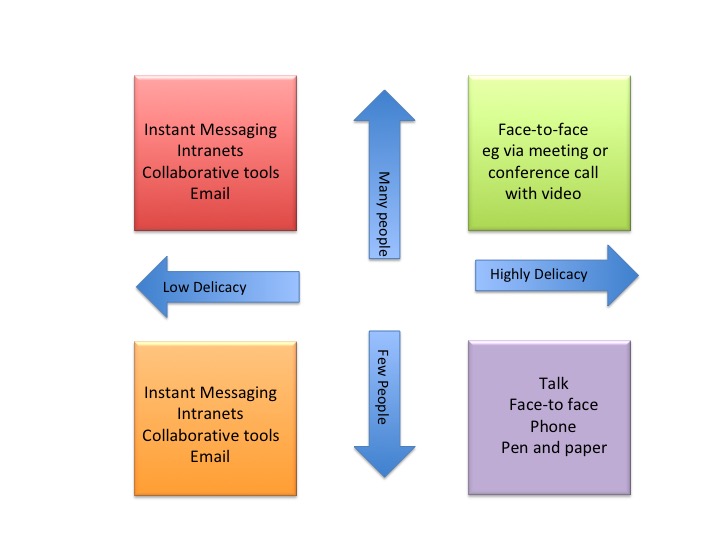As IORG Social Media Chair, for the past four weeks my theme has been whether or not business email overload will still be a problem in 2019 and if so can we reduce it. Thinking outside the inbox will a key way to reduce business email overload in 2019. (A shorter version was published on the IORG website).
Thinking outside the inbox is neither easy nor intuitive, There are now multiple excellent other ways to communicate electronically from instant messaging via Skype for Business or What’s App to sophisticated collaborative tools like Slack or SharePoint. Sadly, what often happens is that organisations adopt alternatives to email with no clear guidelines on what to use when. With no clear conventions and frameworks all that happens is that email overload turns into a severe attack of information overload because now you have at least three if not four or five different channels to check.
In the absence of organisational guidelines, here is a simple framework which others with whom I have worked have found very useful. Its called the PNPD Framework for Thinking Outside the Inbox
For any form of communication, there are basically four factors to consider when deciding which medium to use.

Here are two examples of how to apply the PNPD framwork to think outside the inbox to reduce email and information overload.
Scenario 1 – Conversation
Private between two people, delicate but a permanent record of the final discussion will be needed (eg performance appraisal, salary negotiation, disciplinary meeting).
Best option – conversation (face-to-face if possible otherwise virtual) followed up by an email confirming the discussion.
Privacy is high: Numbers are low: Permanency is high: Delicacy is high.
Scenario 2 – Instant messaging
A public message for several people if not the whole office which if not seen here and now is of no relevance later. It does not matter how people react. For example, testing the fire alarm, cakes for your birthday.
Best option – Instant messaging.
Privacy is low: Numbers are high: Permanency is low: Delicacy is low.
For more information on the PNPD Thinking Outside the Inbox Framework see Taking Control of Your Inbox.
It is my view that email is here to stay and the real challenge is how to manage our use of it better. Clearly one way is to manage the actual flow of email traffic in and out of your inbox more efficiently. In relation to the former this means being brave and thinking outside the inbox and consciously choosing to use an alternative.
What is your view?
Tags: IORG, Reduce business email overload, Taking Control of Your Inbox, Thinking Outside the Inbox
I have no special talent. I am only passionately curious.
Einstein
After writing for over a decade about business email management to reduce business email overload it is sometimes hard to find material which adds anything new to what we know about how best to manage email to save time, improve well-being and performance. Often it’s the same tips and hints and studies just packaged differently. Over the last few weeks three have stood out.
1. Self promoting emails
Have you ever thought of using your Out-Of-Office message to promote yourself in your absence? For example, after telling the sender you are out of the office, then add a line about a recent success story, article about you, research paper etc. This is the latest trend being pushed by Harvard Business School to help you stand out in the ever crowded digital communications world. They suggest that research show that creating a positive view of yourself may help develop better more long standing network relationships. The jury is out on this one. Is it worthwhile or do such self-promoting emails actually have the reverse effect?
Do tell us what you think. Copy of Taking Control of Your Inbox for the best comments (for or against).
2.The state of email security?
In the last twelve month most organisations have seen a significant increase in email born cyber attacks and especially phishing attacks. This useful e-book (from Mimecast) highlights the status of email initiated cyber crime and provides advice on how to limit such attacks. Key is a robust training programme. This is something we, Mesmo Consultancy, would be pleased to talk to you about.
Meanwhile for some quick here and now tips to reduce the risk of cyber crime click here.
3.IORG Information Overload Day Webinar 2018
This year’s theme was cognitive science, addiction and information overload. One of the most interesting sessions was by Anne McGhee Stinson on ‘Neuroscience and Information Overload’. Specifically she talked about how our brain changes according to what we do and pay attention to. Her session is about 12 minutes in. Towards the end there is also a panel session which includes Dr Seeley on dealing with email addiction. Again if this is an issue for you or your colleagues why not call us to discuss how we have been helping other organisations. Click here for a quick check on your own personal level of email addiciton.
Tags: Business email management, Business email overload, Email Addiciton, Email born cyber crime, email cyber crime, email security, IORG
After writing about business email overload for the past decade, it still amazes me to hear executives complain about receiving over 70 emails a day but still having done nothing to identify why and what can be done to reduce email overload. This includes the whole spectrum of employees from CEOs to PAs.
Should I be surprised? After all many have suggested that email is nearing the end of its life and will be overtaken by collaborative tools and social media. Yet the data from Radicati suggests otherwise with email volumes set to rise by 4% in 2019.
Business email overload is generally a symptom of a wider personal, team or organisational failing. For example, lack of ability to focus on the task in hand, prioritise, insufficient opportunities to talk to one’s boss so instead we email, a need to cover one’s backside, no clear e-communications guidelines as to what to use when and so it goes on.
These are some of the more common underlying causes of business email overload which I have observed over the last decade. There are several easy ways to reduce the time spent dealing with unnecessary emails and these include:
As I take over the Social Media Chair for IORG for November (from my colleague Alfonso Aranda Arias), these are some of the issues I will address in a series of Blogs and Tweets.
Tags: Business email overload, email overload, IORG, Radicati Group
 This months business email management articles of note feature one by ourselves on how to manage the instant reply syndrome yet still make key clients feel loved. There are three on business email etiquette and the importance of communicating clearly if you want people to notice your email without being pushy. There are two on various aspects of cyber crime from house deposits going to imposter’s bank accounts and the penalty for forwarding confidential emails and then trying to delete the evidence.
This months business email management articles of note feature one by ourselves on how to manage the instant reply syndrome yet still make key clients feel loved. There are three on business email etiquette and the importance of communicating clearly if you want people to notice your email without being pushy. There are two on various aspects of cyber crime from house deposits going to imposter’s bank accounts and the penalty for forwarding confidential emails and then trying to delete the evidence.
1. Managing the Instant Reply Syndrome. You are working on an important (maybe time critical) task, yet people still expect an instant reply to their email. Based on our recent work in the independent schools sector here are some ways to manage expectations including those of your most important clients and colleagues.
2. Use stories to highlight your companies purpose. From Erica Keswin my fellow member of the Information Overload Research Group IORG this fascinating article highlights the importance on story telling to communicate your message clearly. Although emails should be short, using a client/colleague comment in the opening sentence can help your message stand out.
3. How I lost my 25 year battle against corporate claptrap. How can you commit 110%? It’s mathematical nonsense as Lucy Kellaway points out. Lucy has been the Financial Times business columnist who can be depended on to de-bunk current management guff. In her last column based on examples collected over the years she provides examples of how to write pure meaningless flannel. There are salient lessons on email etiquette to be drawn from this article. Never use long/complex words when a short one will do. Emails should be succinct and structured if you want to avoid endless rounds of email ping-pong and potential email wars. See Mesmo Consultancy’s recent video on the 5Ss of business email management etiquette.
Thank you Lucy Kellaway for writing the introduction to Brilliant Email and being subjected to a Mesmo Consultancy Email Inbox Audit from which we learnt some lessons.
4 Why those small words in an email say a lot about you. A timely reminder that how you write emails is a picture of you and your organisation. It’s your digital dress code. So why spoil a good suit by wearing war paint on your face and scruffy shoes. That is essentially what you are doing when you forget to include a greeting and use a sloppy sign-off. Check your business email etiquette. Is it up to the mark?
5. Cyber crooks loot millions set aside for house sales. It never ceases to amaze us at Mesmo Consultancy how people still fall for the simplest of cyber crime tricks. House sellers transferring deposits found that Instead of the money going to the solicitors they went to an imposter’s bank account. When undertaking such transactions always transfer a very small amount first to check they arrive in the correct account. Will we ever learn?
6. Employee sentenced to six weeks imprisonment for deleting confidential emails. So you think you can delete emails and go un-noticed? Think again. This article contains lessons for both employers and employee about sending confidential information via email.
Are these business email management issues which you or your organisation face? Call or email us now to discuss how our email best practice workshops and consultancy service can help you.
Tags: business email etiquette, cyber crime, Erica Keswin, IORG, Lucy Kellaway

How can you safeguarding your organisation from the risks of such email fiascos? One easy way is to invite Mesmo Consultancy to run an email management and business email etiquette masterclass.
Tags: business email etiquette, Email fiasco, email management, George Pinkham, Hertford College, IORG, King & Wood Mailesons, Mesmo Consultancy, Michael Einstein, Oxford, Quora, Strong Password